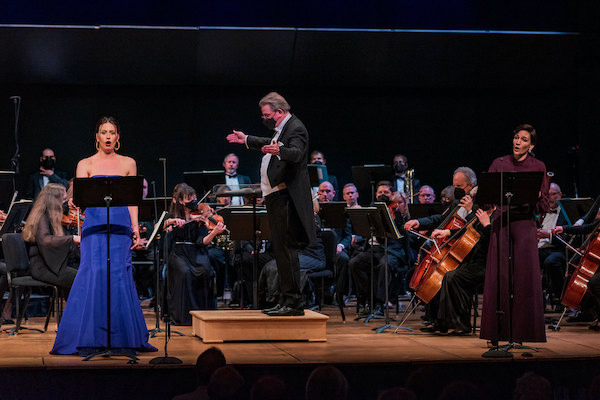Washington Concert Opera serves up a vocally opulent “Orphée”

Antony Walker conducted Washington Concert Opera’s performance of Gluck’s Orphée with Kate Lindsey (right) and Jacquelyn Stucker. Photo: Caitlin Oldham
Baltimore Concert Opera put on Cilea’s refulgently orchestrated Adriana Lecouvreur this weekend, accompanied only by piano. Yet when Washington Concert Opera presented Gluck’s intimate Orphée, Sunday at Lisner Auditorium, the singers were accompanied by the expanded Berlioz orchestration (barely larger than the usual Gluck).
Any chance to experience a Gluck opera in concert is a rare pleasure. Gluck’s operas, like Wagner’s, are ritual enactments of universal myths, and it’s nice to appreciate this music and story without worrying about how well Gluck’s characters imitate the niceties of human behavior (they don’t).
Orphée is a ‘conductor’s opera.’ The opera has so little action and so few vocal set pieces that engagement almost lies entirely in the conductor’s ability to shape, pace, and energize. Regardless of performing version, many a celebrated conductor’s can make this 90-minute opera feel three hours long. Furthermore, the acid test for any conductor is to shape and energize an opera while conducting a freelance company on limited rehearsal time.
Within fifteen minutes, Antony Walker made clear that we were in the hands of a master. For all its lack of refinement, the orchestra sang in the absence of singers and danced in the absence of dancers. Some of the most exciting numbers in the opera were cut, but pacing nevertheless crackled in an opera that often dies well before Orpheus makes it to the underworld. If there were occasional moments when coordination was faulty and the orchestra covered the singers, what was remarkable was how seldom it happened in a score fraught with obstacles. Indeed, the only place where coordination was truly faulty was, oddly, in the famous Dance of the Blessed Spirits.
Mezzo Kate Lindsey was an Orphée of delightfully light and clear timbre with intonation of iron dependability in all but the fastest coloratura passages. A dozen passages were nothing short of breathtaking in head and chest voice each, as was her ability to sing with control at the quietest conceivable dynamics. There were worrisome moments when her otherwise stunning instrument struggled to make herself heard at anything above a soft dynamic. Nevertheless, in the all-important aria at the end of Act 1, she capped it with a cadenza of towering sublimity.
Poor Orpheus is inevitably paired with a singer of whom one can only say ‘poor Eurydice.’ No matter how good the singer, we only hear her for twenty minutes and a singer whose part is by no means easy gets little credit. In Jacquelyn Stucker, our Eurydice was very good indeed—a soprano possessing a voice of uncommon opulence for modern Gluck productions, with an atypically large gift for dramatic characterization that shone through even in concert setting.
Equally capable in her differing way was Helen Zhibing Huang’s Cupid, enacted with welcome comic schtick and a bright coloratura as light as air.
The WCO chorus was coached by David Hanlon to have a beautifully blended sound, neither eschewing vibrato nor embracing it. Due to the limitations of stage space, the entire chorus had to be seated to the left of the orchestra and in back of them, which resulted in intonation problems during the opera’s gorgeous opening chorus. Later in the opera, Mr. Walker placed the chorus a few steps forward, which resulted in a remarkable improvement in the chorus’s coordination. For the rest of the performance, even when at the back of the stage, the chorus acquitted themselves wonderfully with both refinement and dramatic involvement.
Andile Ndlovu and Nardia Boodoo from Washington Ballet contributed lovely dancing
Evan Tucker is a writer, composer, violinist, and podcaster living in Baltimore.


